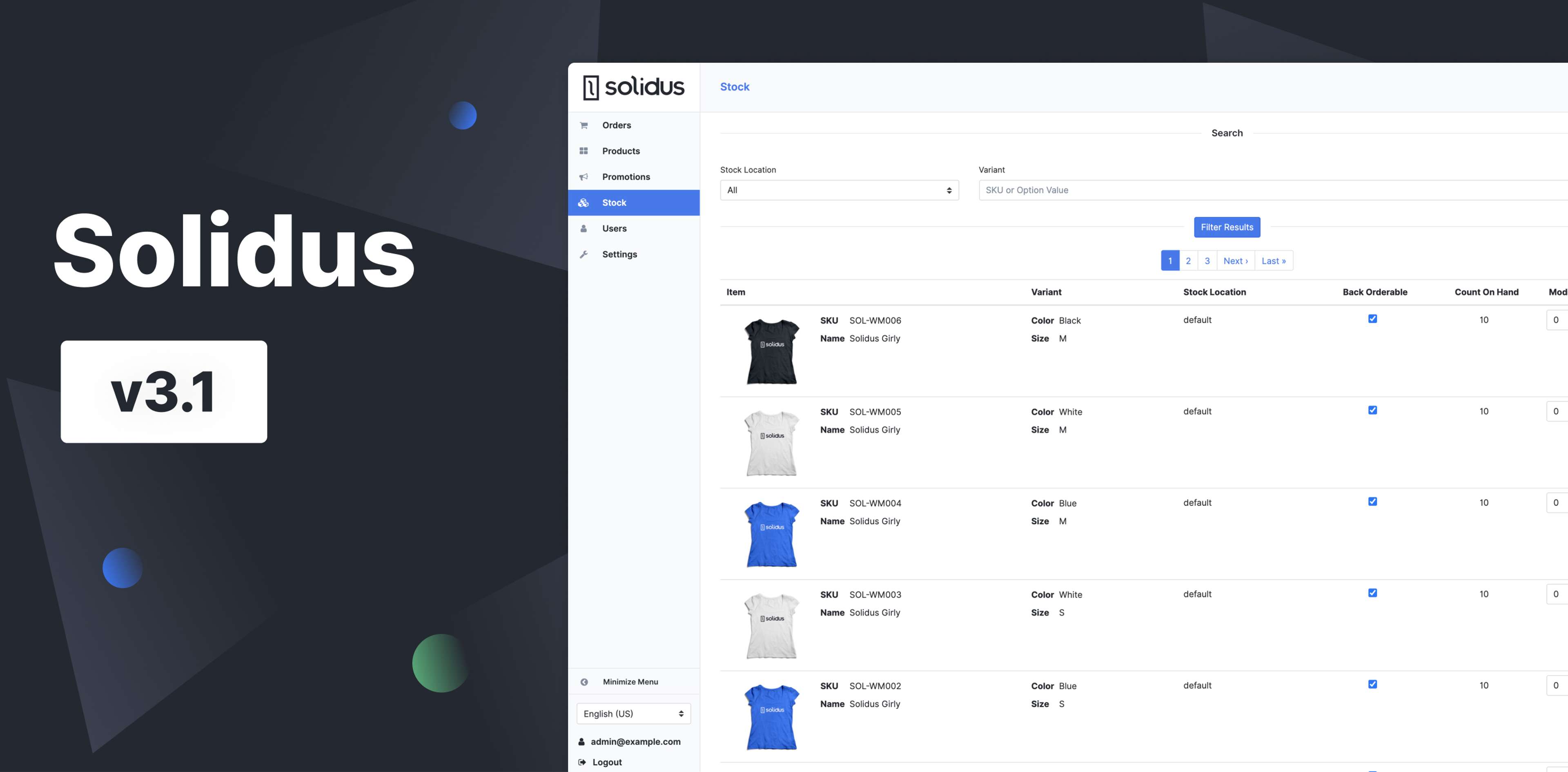Solidus v3.1

Solidus Core Team
10 Sept 2021 - 5 mins read

We've just released Solidus v3.1.0!
Thanks to all contributors, testers, and users who made this release possible.
This version's support will end in 18 months: 2023-03-10.
What's next?
For the next minor release (3.2.0), we plan to make huge changes to the Event Bus, in order to provide a solid architecture with a set of tools that will help developers use this feature. We are planning to release a new adapter along with the current one, to allow Solidus' users some time to switch, which could require some code change in the host applications.
The main features of the new Event Bus Adapter are:
- Isolation from
ActiveSupport::Notification. - Better observability for event-generated flows.
- Better testability.
- More robust events registration.
What changed on Solidus 3.1
Here's what changed in the last released version. If you have any trouble updating or you want to leave some feedback, please use this GitHub Discussion.
Major changes
Spree.load_defaults: preference defaults depending on the Solidus version
Solidus 3.1 brings a new feature where preference defaults can take different values depending on a specified Solidus version. It makes it possible to stop deprecating old defaults every time we introduce a change in the recommended value for a setting. After all, they're just that; recommendations. Instead, now users can explicitly ask for a given Solidus version defaults and, as before, override the preferences they want.
When upgrading to 3.1, you have to take action to adopt the new behavior.
You'll need to add Spree.load_defaults('3.1') on the very top of your
spree.rb initializer. As we're not changing any preference default on this
release, nothing will break. A warning will be emitted on boot-up until you do
it!
However, bumping the version given to load_defaults straight away for future
upgrades will not be a safe option. Instead, you'll have to go through the new
update process detailed below.
Take a look at #4064 for more information.
New update process
As aforementioned, preference defaults can change after a Solidus release. Once you have your defaults locked to the current Solidus version, a new upgrade won't break your application because of them. However, it's a good idea to adapt your application to the updated recommended settings. To help with this process, Solidus comes with a generator that you can execute like this:
bin/rails g solidus:update
That generator will create a new initializer called new_solidus_defaults.rb,
which will preview all the defaults that have changed between versions, each on
a commented line. From that point, you can activate the new defaults one by one
and adapt your application incrementally. Once you're done with all of them,
you can bump the version given to Spree.load_defaults in the spree.rb
initializer and remove the new_solidus_defaults.rb initializer altogether.
You can read in more detail about this process on our guides.
On #4087 you can find more.
Other important changes
Spree::Price#amount field can no longer be nil. Besides adding the
validation at the model layer, we ship with a task that will remove records
where the amount is NULL in the database. You should run the task before
executing the new migrations:
bin/rails solidus:delete_prices_with_nil_amount
bin/rails railties:install:migrations
bin/rails db:migrate
If you're running migrations automatically on deploy, you should run the task before rolling out the new code. In that case, you first should make sure that you have affected records:
Spree::Price.where(amount: nil).any?
If the above code returns false, you don't need to do anything else.
Otherwise, copy the
task
into your code, and deploy & execute it. Another option is to execute it
manually in your console in production. However, be extremely careful when
doing that!! :warning: :warning: :warning:
Spree::Price.where(amount: nil).delete_all
Take a look at PR #3987 for more details.
Other Changes
But there's also a lot of other stuff in this release! If you want to see the full list of the changes made, plase take a look at the project's CHANGELOG on GitHub.